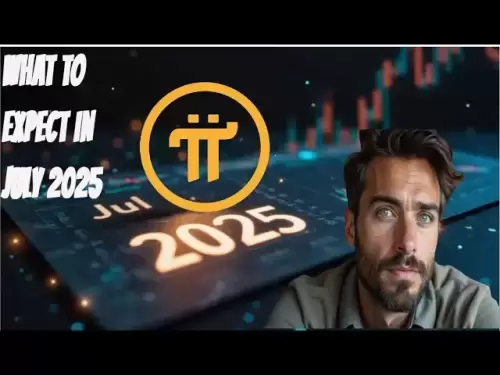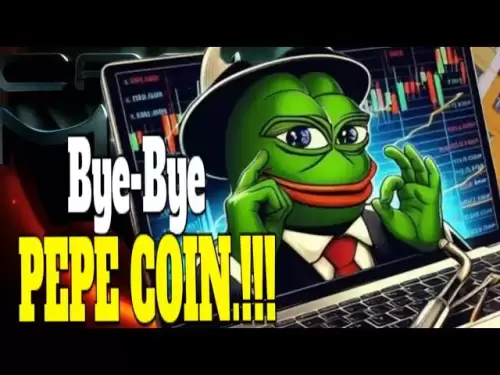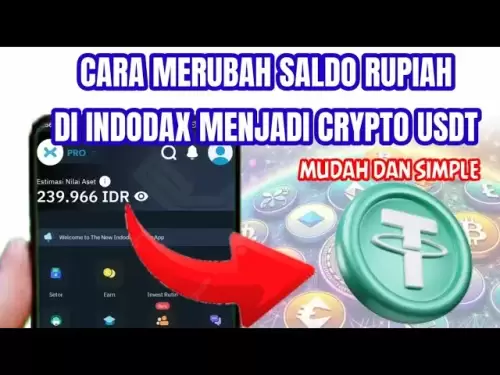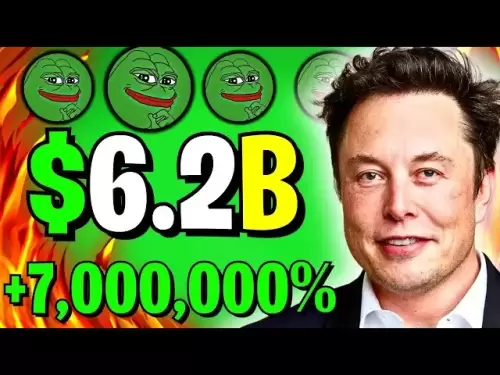-
 Bitcoin
Bitcoin $106,731.2224
-1.05% -
 Ethereum
Ethereum $2,444.9804
-1.20% -
 Tether USDt
Tether USDt $1.0003
0.01% -
 XRP
XRP $2.1882
0.09% -
 BNB
BNB $651.1435
-0.61% -
 Solana
Solana $148.3252
-2.09% -
 USDC
USDC $1.0000
0.01% -
 TRON
TRON $0.2787
0.55% -
 Dogecoin
Dogecoin $0.1598
-3.16% -
 Cardano
Cardano $0.5520
-2.43% -
 Hyperliquid
Hyperliquid $39.0960
-2.64% -
 Bitcoin Cash
Bitcoin Cash $516.9519
2.98% -
 Sui
Sui $2.7011
-2.95% -
 Chainlink
Chainlink $13.0582
-1.71% -
 UNUS SED LEO
UNUS SED LEO $8.9250
-2.53% -
 Stellar
Stellar $0.2359
-0.18% -
 Avalanche
Avalanche $17.3856
-3.73% -
 Toncoin
Toncoin $2.8095
-3.56% -
 Shiba Inu
Shiba Inu $0.0...01121
-1.95% -
 Litecoin
Litecoin $85.2795
-0.85% -
 Hedera
Hedera $0.1471
-2.15% -
 Monero
Monero $319.8004
1.12% -
 Dai
Dai $1.0001
0.01% -
 Ethena USDe
Ethena USDe $1.0001
0.02% -
 Bitget Token
Bitget Token $4.5344
-1.07% -
 Polkadot
Polkadot $3.3224
-2.96% -
 Uniswap
Uniswap $6.9697
-2.75% -
 Aave
Aave $266.1658
-2.25% -
 Pepe
Pepe $0.0...09414
-3.41% -
 Pi
Pi $0.4913
-3.29%
Token Economics of Request (REQ) Coin
Request Network's REQ token plays a crucial role in the decentralized payment request ecosystem, facilitating transactions, rewarding participation, and ensuring network stability through its well-designed tokenomics and future prospects.
Dec 26, 2024 at 04:26 pm
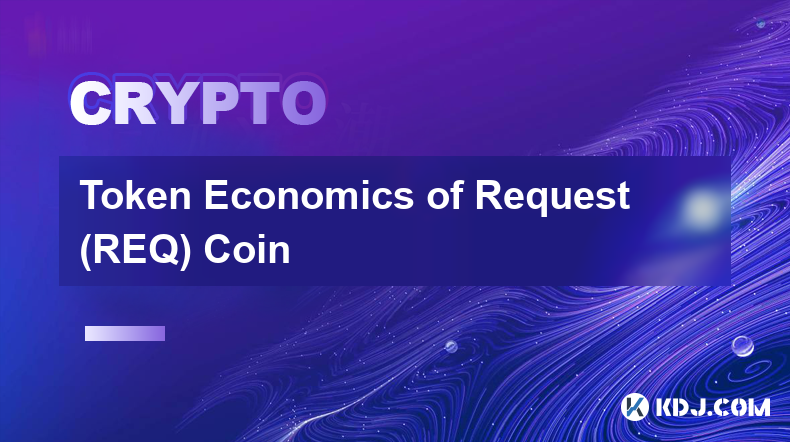
Key Points:
- Request (REQ) Token Overview
- Token Distribution and Allocation
- Token Function and Usage
- Tokenomics of Request Network
- Token Supply and Issuance
- Value Drivers of REQ Token
- Future Prospects and Developments of REQ Token
Request (REQ) Token Overview:
Request Network is a decentralized network that enables the creation and management of payment requests. The REQ token is the native cryptocurrency of the Request Network, facilitating transactions, incentivizing participation, and ensuring the network's security.
Token Distribution and Allocation:
During its initial coin offering (ICO) in 2017, Request Network allocated 62% of the tokens (1 billion REQ) to the public sale, 20% to the team, 15% to the Request Foundation, and 3% to core contributors. Token distribution remained relatively stable after the initial sale.
Token Function and Usage:
REQ tokens serve various functions within the Request Network ecosystem:
- Payment Requests: REQ is used to pay for the services of the Request Network, including creating and responding to payment requests.
- Network Fees: Network participants, such as requestors, providers, and dispute resolvers, pay fees in REQ for using the network's services.
- Stakeholder Incentives: REQ rewards participants for contributing to the network's security, resolving disputes, and providing feedback in requestors' favor.
- Governance: REQ holders can participate in Request Network governance, proposing and voting on network enhancements and changes.
Tokenomics of Request Network:
The tokenomics of Request Network are designed to incentivize participation, ensure network stability, and foster community growth:
- Staked Tokens: Participants must stake REQ tokens to participate in the dispute resolution process and receive rewards for resolving disputes fairly.
- Token Burn Mechanism: Network fees paid in REQ are partially burned, reducing the token supply and increasing the scarcity of REQ tokens.
- Participation Rewards: Requestors who make payments using REQ and providers who accept payments in REQ earn rewards, promoting network usage.
Token Supply and Issuance:
The total supply of REQ tokens is fixed at 1 billion, with no issuance planned in the future.
Value Drivers of REQ Token:
Key factors that may drive the value of the REQ token include:
- Network Adoption: Increased usage of the Request Network for payment requests and dispute resolution services increases the demand for REQ.
- Transaction Fees: The volume of transactions on the Request Network determines the fees generated and the value of REQ used in fee payments.
- Investor Interest: Market demand and speculative buying influence REQ's price based on its potential as an investment asset.
- Network Developments: Innovative features, community partnerships, and ecosystem expansions can enhance Request Network's value proposition, positively impacting REQ.
Future Prospects and Developments of REQ Token:
Request Network has an active development roadmap, with plans to expand its use cases, improve scalability, and integrate with other ecosystems:
- Enterprise Integrations: Request Network is exploring partnerships with traditional financial institutions for enterprise adoption.
- Cross-Chain Interoperability: Future developments aim to enable REQ usage on multiple blockchains for expanded payment options.
- Decentralized Dispute Resolution: The network plans to enhance its dispute resolution framework with more refined decision-making capabilities.
**FAQs Related to the Keywords in the
Disclaimer:info@kdj.com
The information provided is not trading advice. kdj.com does not assume any responsibility for any investments made based on the information provided in this article. Cryptocurrencies are highly volatile and it is highly recommended that you invest with caution after thorough research!
If you believe that the content used on this website infringes your copyright, please contact us immediately (info@kdj.com) and we will delete it promptly.
- UniCredit, Bitcoin, and BlackRock ETF: A New Era of Crypto Investment?
- 2025-07-02 00:30:12
- UniCredit, Bitcoin ETF, and BlackRock: A New York Minute on Crypto's Big Players
- 2025-07-02 00:30:12
- Boba Network: $70M Funding & FTX Recovery – What's the Deal?
- 2025-07-01 22:50:11
- Sentiment Data's Hidden Gems: Top Performing Cryptos You're Missing
- 2025-07-01 23:10:15
- Deutsche Bank's Bitcoin Custody Play: A New York Minute on Crypto Services
- 2025-07-01 22:30:12
- Avalanche, Partnership, and Bitcoin: A New York Minute on Crypto Convergence
- 2025-07-01 23:10:15
Related knowledge

How to customize USDT TRC20 mining fees? Flexible adjustment tutorial
Jun 13,2025 at 01:42am
Understanding USDT TRC20 Mining FeesMining fees on the TRON (TRC20) network are essential for processing transactions. Unlike Bitcoin or Ethereum, where miners directly validate transactions, TRON uses a delegated proof-of-stake (DPoS) mechanism. However, users still need to pay bandwidth and energy fees, which are collectively referred to as 'mining fe...

USDT TRC20 transaction is stuck? Solution summary
Jun 14,2025 at 11:15pm
Understanding USDT TRC20 TransactionsWhen users mention that a USDT TRC20 transaction is stuck, they typically refer to a situation where the transfer of Tether (USDT) on the TRON blockchain has not been confirmed for an extended period. This issue may arise due to various reasons such as network congestion, insufficient transaction fees, or wallet-rela...

How to cancel USDT TRC20 unconfirmed transactions? Operation guide
Jun 13,2025 at 11:01pm
Understanding USDT TRC20 Unconfirmed TransactionsWhen dealing with USDT TRC20 transactions, it’s crucial to understand what an unconfirmed transaction means. An unconfirmed transaction is one that has been broadcasted to the blockchain network but hasn’t yet been included in a block. This typically occurs due to low transaction fees or network congestio...

How to check USDT TRC20 balance? Introduction to multiple query methods
Jun 21,2025 at 02:42am
Understanding USDT TRC20 and Its ImportanceUSDT (Tether) is one of the most widely used stablecoins in the cryptocurrency market. It exists on multiple blockchain networks, including TRC20, which operates on the Tron (TRX) network. Checking your USDT TRC20 balance accurately is crucial for users who hold or transact with this asset. Whether you're sendi...

What to do if USDT TRC20 transfers are congested? Speed up trading skills
Jun 13,2025 at 09:56am
Understanding USDT TRC20 Transfer CongestionWhen transferring USDT TRC20, users may occasionally experience delays or congestion. This typically occurs due to network overload on the TRON blockchain, which hosts the TRC20 version of Tether. Unlike the ERC20 variant (which runs on Ethereum), TRC20 transactions are generally faster and cheaper, but during...

The relationship between USDT TRC20 and TRON chain: technical background analysis
Jun 12,2025 at 01:28pm
What is USDT TRC20?USDT TRC20 refers to the Tether (USDT) token issued on the TRON blockchain using the TRC-20 standard. Unlike the more commonly known ERC-20 version of USDT (which runs on Ethereum), the TRC-20 variant leverages the TRON network's infrastructure for faster and cheaper transactions. The emergence of this version came as part of Tether’s...

How to customize USDT TRC20 mining fees? Flexible adjustment tutorial
Jun 13,2025 at 01:42am
Understanding USDT TRC20 Mining FeesMining fees on the TRON (TRC20) network are essential for processing transactions. Unlike Bitcoin or Ethereum, where miners directly validate transactions, TRON uses a delegated proof-of-stake (DPoS) mechanism. However, users still need to pay bandwidth and energy fees, which are collectively referred to as 'mining fe...

USDT TRC20 transaction is stuck? Solution summary
Jun 14,2025 at 11:15pm
Understanding USDT TRC20 TransactionsWhen users mention that a USDT TRC20 transaction is stuck, they typically refer to a situation where the transfer of Tether (USDT) on the TRON blockchain has not been confirmed for an extended period. This issue may arise due to various reasons such as network congestion, insufficient transaction fees, or wallet-rela...

How to cancel USDT TRC20 unconfirmed transactions? Operation guide
Jun 13,2025 at 11:01pm
Understanding USDT TRC20 Unconfirmed TransactionsWhen dealing with USDT TRC20 transactions, it’s crucial to understand what an unconfirmed transaction means. An unconfirmed transaction is one that has been broadcasted to the blockchain network but hasn’t yet been included in a block. This typically occurs due to low transaction fees or network congestio...

How to check USDT TRC20 balance? Introduction to multiple query methods
Jun 21,2025 at 02:42am
Understanding USDT TRC20 and Its ImportanceUSDT (Tether) is one of the most widely used stablecoins in the cryptocurrency market. It exists on multiple blockchain networks, including TRC20, which operates on the Tron (TRX) network. Checking your USDT TRC20 balance accurately is crucial for users who hold or transact with this asset. Whether you're sendi...

What to do if USDT TRC20 transfers are congested? Speed up trading skills
Jun 13,2025 at 09:56am
Understanding USDT TRC20 Transfer CongestionWhen transferring USDT TRC20, users may occasionally experience delays or congestion. This typically occurs due to network overload on the TRON blockchain, which hosts the TRC20 version of Tether. Unlike the ERC20 variant (which runs on Ethereum), TRC20 transactions are generally faster and cheaper, but during...

The relationship between USDT TRC20 and TRON chain: technical background analysis
Jun 12,2025 at 01:28pm
What is USDT TRC20?USDT TRC20 refers to the Tether (USDT) token issued on the TRON blockchain using the TRC-20 standard. Unlike the more commonly known ERC-20 version of USDT (which runs on Ethereum), the TRC-20 variant leverages the TRON network's infrastructure for faster and cheaper transactions. The emergence of this version came as part of Tether’s...
See all articles





















